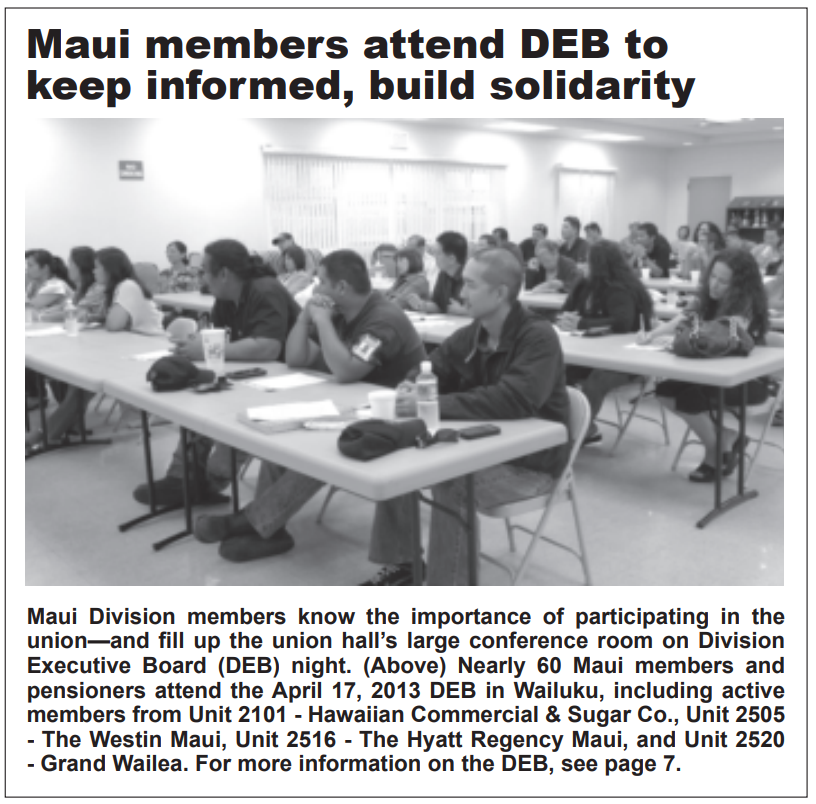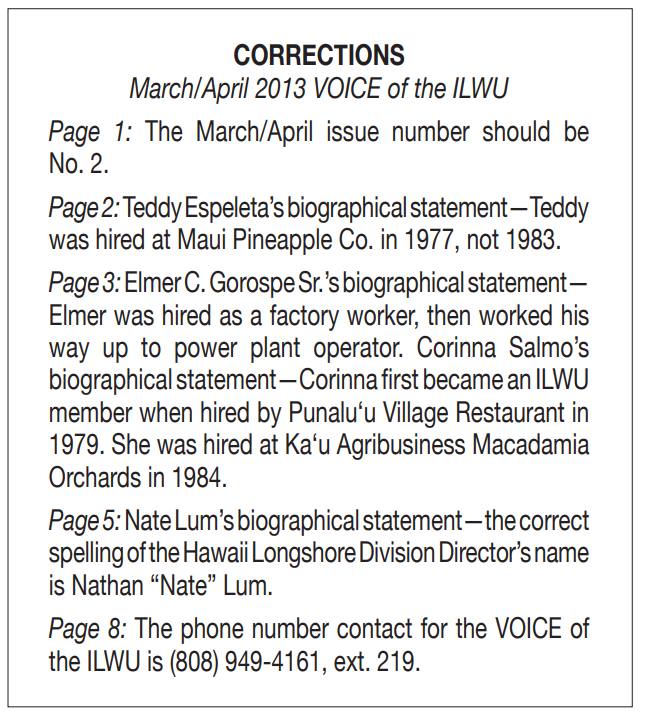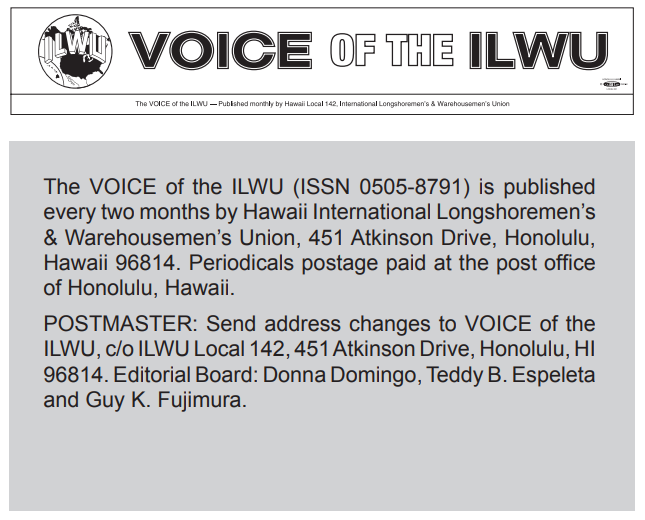Are You a New Member?
Then this is for you!
Are you a new employee, hired within the last twelve months? If so, this issue of the Voice of the ILWU was prepared especially for you. As a union member, you are entitled to many rights and benefits and some responsibilities. This issue will help get you started with the essential information you need as a member of the ILWU. Even longtime members may find the information useful.
First of all, the Voice of the ILWU is the official newspaper of the ILWU Local 142. You are receiving the newspaper because you are now a member of the ILWU. Your membership in the ILWU started when you were hired into your job. At the time you were hired, you signed a form, which allows for the automatic payment of union dues by payroll deduction.
This form also serves as an application for membership in the union.
As a member of ILWU Local 142, you are part of a long and proud tradition where workers join or form organizations for their mutual benefit and to promote fairness and justice on the job. These organizations are called labor unions, trade unions, or just unions.
In Hawaii, one out of every four workers are members of a labor union.
The most common kind of union is based on the job the worker does. For example, there are unions of airline pilots, firefighters, bricklayers, teachers, and nurses, and only workers who do those jobs are members of those unions. Another kind of union is based on an entire industry—such as hotel workers, government employees, or postal workers. A third kind of union, like the ILWU, organizes and includes workers from many different industries.
This kind of unionism brings the highest level of unity to workers.
There are 18,000 ILWU members on all major islands in Hawaii, which makes the ILWU one of the largest unions in Hawaii.
ILWU members work in every major industry including: tourism, longshore, sugar, pineapple, manufacturing, transportation, and hospitals. ILWU members hold diverse jobs—they include mechanics, drivers, cooks, hotel housekeepers, store cashiers, computer clerks, hospital technicians, and more.

“An injury to one is an injury to all”
“An injury to one is an injury to all”—you may have heard this slogan used in conjunction with the ILWU before. The slogan means that we stand together as workers.
to an organization with a long and proud history in Hawaii, the West Coast, and Canada. The ILWU is respected and admired within the labor movement in the U.S. and around the world.
Community and political leaders appreciate how the ILWU improved the lives of the entire community. Employers respect the ILWU as a strong, yet reasonable union.
Historians credit the ILWU with organizing a powerful, industry-wide, interracial union which made it possible for Hawaii to become a modern democracy with the highest standard of living of any Pacific island.
• The ILWU is respected for its internal democracy. The members run the union. There has never been top-down leadership where the union is controlled by a few powerful individual officers. All top officers are elected by direct vote of the membership.
• The ILWU is known for honesty and integrity. There has never been a taint of corruption in any ILWU leader. ILWU members have the power to remove any officer who misuses their position. The wages of ILWU officers are set by members who meet in Convention every three years. The Convention approves the union’s budget and programs. Members serve as trustees and watch every expense the officers make. ILWU dues are among the lowest of any union and ILWU officers earn far less than the officers of other unions.
• The ILWU is respected for its commitment to civil rights and racial equality. The ILWU was the first union to successfully organize workers of all races into a union. Hawaii’s employers divided workers by race and the only way the ILWU could succeed was by fighting against discrimination of any kind. When the employers tried to use the government and the courts to break the union, the ILWU survived by fighting to protect the Constitutional and civil rights of working people.
• The ILWU is known for its active involvement in political action that has improved lives for the whole community, and not just its own members. The ILWU has worked to fund rural hospitals, increase funding for public schools, improve roads, protect the environment, provide social services for the needy, and increase the minimum wage. ILWU members live on every island and work in every industry. Lifting the standards for the whole community also brings up the standards of ILWU members.
• The ILWU is respected for its progressive view that workers of the world share a common interest and unions should work for world peace. The ILWU has its roots in the longshore industry which is based on global trade. ILWU members understand the need for international solidarity. Only employers profit from war, while workers are the soldiers who fight and die in war. The ILWU took a lead in opposing the wars in Vietnam and Iraq.
• The ILWU is known for its militancy and ability to fight for its membership, but is ready to work cooperatively with reasonable employers for the long-term survival of an industry. The ILWU has negotiated some of the best contracts of any union. However, ILWU members have also agreed to defer wages and benefits to help employers get through tough economic times.
• The ILWU is respected for upholding union principles and labor solidarity. The ILWU has always worked to unify the labor movement and has good working relations with other unions. The ILWU has always organized the unorganized to bring the benefit of unionism to all workers. The ILWU has such a diverse membership because it organized in every industry where workers wanted and needed to be unionized.
The ILWU was founded as a progressive, democratic, rank-andfile union. These principles are embedded in our union’s culture and traditions and guide our daily activities. These principles are written into the Constitution and Bylaws of our union.
Look for information on Kauai Division and Kauai elected full-time officers in an upcoming issue of the VOICE of the ILWU


